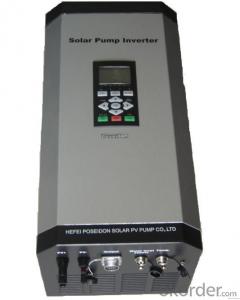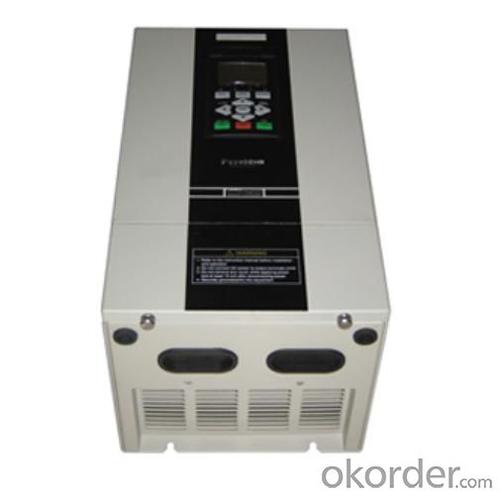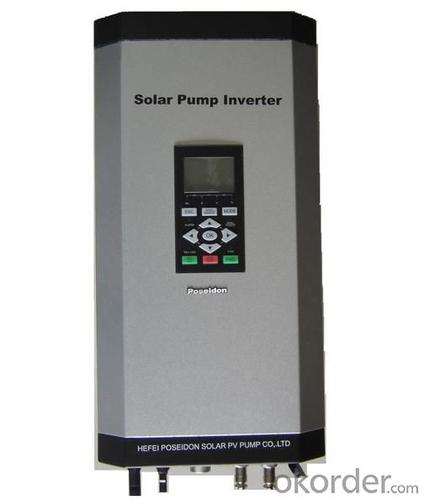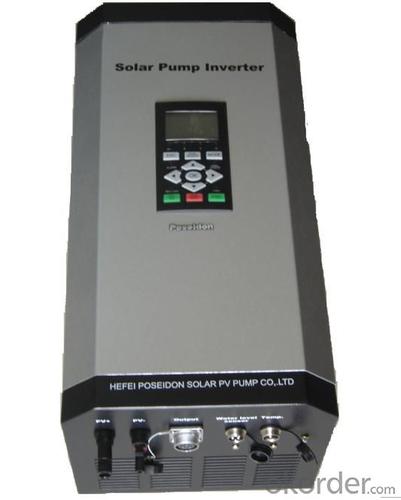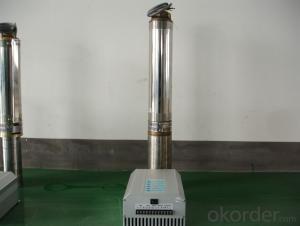Solar Pump for Water Fountain FCPM15KH Inverter
- Loading Port:
- China Main Port
- Payment Terms:
- TT OR LC
- Min Order Qty:
- -
- Supply Capability:
- -
OKorder Service Pledge
Quality Product, Order Online Tracking, Timely Delivery
OKorder Financial Service
Credit Rating, Credit Services, Credit Purchasing
You Might Also Like
Solar pump inverter FCPM15KH Product Description:
Solar water pumping system is constructed with solar panel array,solar pump inverter and AC water pump, DC current produced from solar panel will be delivered to solar pump inverter,and it will convert it into AC current to drive water pump,and will automatically regulate output frequency according to sun radiance intensity,maximally realize MPPT tracking function.
Features
Adopting the proposed dynamic VI maximum power point tracking (MPPT) control method, with fast response, and reliable operation, achieves efficiency of 99%.
Designed with variable frequency driver, greatly improves efficiency
Extremely high efficiency
Digital mode control, with automatic operation and manual operation mode options
Complete protection functions
Adopts intelligent IPM module, with high reliability
LCD display and operation panel, in real time presents operating data
Optional for water level measurement and control circuit
Applicable for general ACC pumps, like centrifugal pump, piston pump etc.
Independent intellectual property; Highly effective, the redundant reliability, exempts the maintenance and the long life.
The pumps are soft started, fully protected.
No batteries are used. So better Sunlight, more water.
Datasheet.
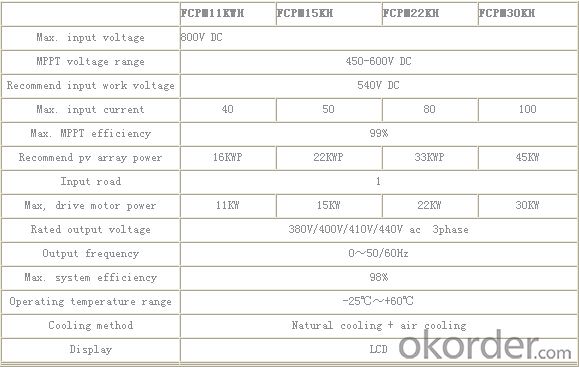
- Q: What is the role of inverters in a solar pump system?
- The role of inverters in a solar pump system is to convert the direct current (DC) electricity generated by the solar panels into alternating current (AC) electricity that is required to power the pump. Inverters also help regulate and control the voltage and frequency of the electricity to ensure optimal performance of the pump system.
- Q: Can a solar pump be used for domestic purposes?
- Yes, a solar pump can be used for domestic purposes. Solar pumps are designed to draw water from a source, such as a well or a reservoir, using energy from the sun. They can be used to supply water for various domestic needs, including irrigation, livestock watering, and household water supply. Solar pumps offer a sustainable and cost-effective solution for meeting domestic water requirements in areas with limited or no access to grid electricity.
- Q: Can a solar pump be used for water supply in dairy farms?
- Yes, a solar pump can be used for water supply in dairy farms. Solar pumps utilize sunlight to generate power for pumping water, making them a sustainable and cost-effective solution for water supply in agricultural settings. They can effectively meet the water requirements of dairy farms, ensuring a reliable source of water for the animals and various farm operations. Additionally, solar pumps are environmentally friendly and can reduce dependence on traditional energy sources, making them a suitable choice for sustainable farming practices.
- Q: How do I protect a solar pump system from lightning strikes?
- Protecting a solar pump system from lightning strikes is crucial to ensure its longevity and functionality. Here are a few steps you can take to safeguard your system: 1. Install a lightning protection system (LPS): A properly designed LPS will divert the lightning strike to the ground, protecting your solar pump system. This typically involves installing lightning rods at the highest points of your system and connecting them to a grounding system. 2. Grounding: Ensure that your solar pump system is properly grounded. This involves connecting all metal components to a grounding conductor that leads to an appropriate grounding electrode, such as a grounding rod. Adequate grounding helps dissipate the electrical charge from a lightning strike. 3. Surge protection devices (SPDs): Install surge protectors in your system to absorb and redirect voltage spikes caused by lightning. SPDs are designed to handle large surges of electricity and prevent damage to sensitive equipment. 4. Shielding and bonding: Shielding your solar pump system involves installing conductive materials, such as metal sheets or mesh, around sensitive components to divert lightning strikes away from them. Bonding involves connecting all metal components together to create a continuous conductive path, reducing the risk of damage from electrical potential differences. 5. Disconnect during storms: Whenever a thunderstorm is approaching, it is advisable to disconnect your solar pump system from the power source and turn it off. This minimizes the risk of damage during a lightning strike. 6. Regular maintenance: Ensure that your solar pump system is regularly inspected and maintained. Check for any loose connections, damaged wiring, or other potential vulnerabilities that could increase the risk of damage from lightning strikes. Promptly repair or replace any faulty components. Remember, while these measures significantly reduce the risk of damage from lightning strikes, they do not provide 100% protection. In extreme cases, it may be necessary to consult with a professional electrician or engineer for a comprehensive lightning protection system tailored to your specific needs.
- Q: Are there any government incentives or subsidies available for solar pump installations?
- Yes, there are various government incentives and subsidies available for solar pump installations in many countries. These incentives aim to promote the adoption of renewable energy sources and decrease reliance on fossil fuels. They may include tax credits, grants, rebates, or low-interest loans from local, state, or national governments. It is advisable to research specific programs and eligibility criteria in your region to fully understand the incentives available for solar pump installations.
- Q: On the issue of pumps and solar panels
- Pump flow and head is inversely proportional to the high flow will become smaller head. And vice versa. 30M of the wells should use at least 750W inch of the pump.
- Q: Can a solar pump be used for rainwater harvesting or collection?
- Yes, a solar pump can definitely be used for rainwater harvesting or collection. Solar pumps utilize energy from the sun to power the pump and transfer water from a source to a storage tank. This makes them an ideal and sustainable option for collecting rainwater, as they eliminate the need for grid electricity. By using a solar pump, rainwater can be efficiently collected and stored for various purposes such as irrigation, household use, or replenishing groundwater.
- Q: Can a solar pump be used for fountain or decorative water features?
- Yes, a solar pump can definitely be used for fountains or decorative water features. Solar-powered pumps are specifically designed to operate using energy from the sun, making them a great option for outdoor water features. They are environmentally friendly, cost-effective, and easy to install since they don't require any electrical wiring. Additionally, solar pumps offer the flexibility of being able to operate even in areas without access to electricity.
- Q: How much water can a solar pump supply?
- The amount of water a solar pump can supply depends on various factors, such as the size and capacity of the pump, available sunlight, and the efficiency of the system. However, solar pumps can typically supply anywhere from a few hundred liters to several thousand liters of water per day, making them a reliable and sustainable option for various water pumping needs.
- Q: Can a solar pump be used for water supply in commercial buildings?
- Certainly! Solar pumps are an excellent choice for water supply in commercial buildings. They offer efficiency and cost-effectiveness, making them a reliable solution. By utilizing solar energy, they not only operate in an environmentally friendly manner but also help reduce operating expenses. These pumps serve multiple purposes, including irrigation, plumbing systems, and even fire suppression systems in larger commercial buildings. The adaptability and dependability of solar pumps make them a suitable option for meeting the water supply requirements of commercial buildings. Furthermore, they require minimal maintenance and have a long lifespan, making them a sustainable choice for water supply in commercial settings.
Send your message to us
Solar Pump for Water Fountain FCPM15KH Inverter
- Loading Port:
- China Main Port
- Payment Terms:
- TT OR LC
- Min Order Qty:
- -
- Supply Capability:
- -
OKorder Service Pledge
Quality Product, Order Online Tracking, Timely Delivery
OKorder Financial Service
Credit Rating, Credit Services, Credit Purchasing
Similar products
Hot products
Hot Searches
Related keywords


